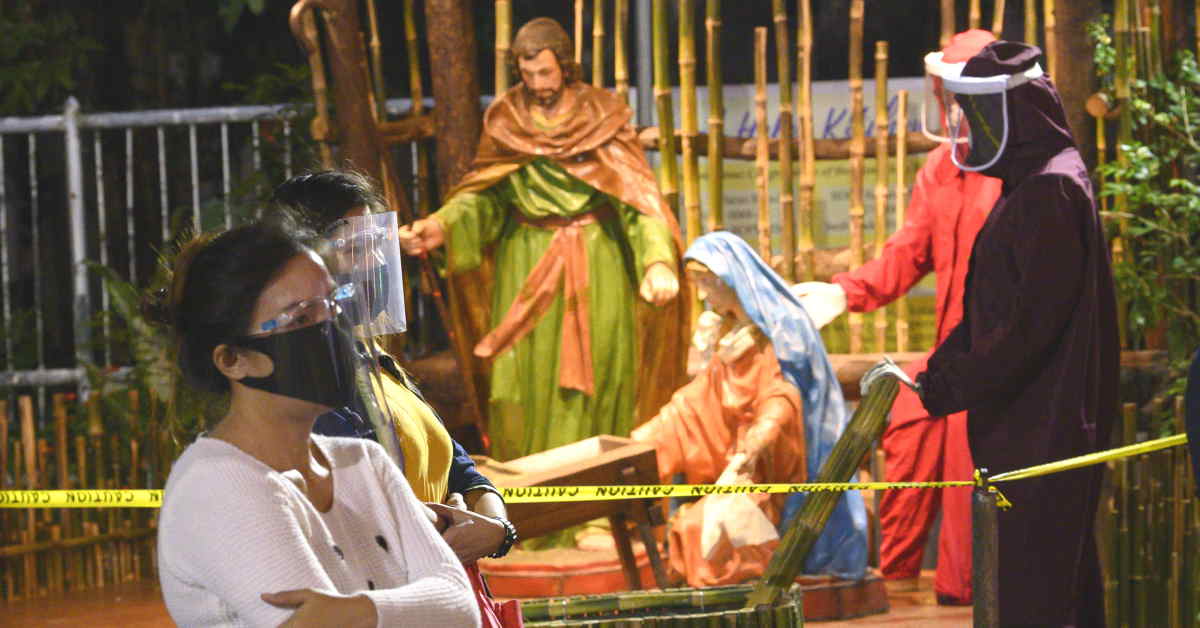25 December is Christmas Day! In the words of singer Andy Williams, it is the “most wonderful time of the year.” For Christians and Catholics alike, it is one of the most awaited times of the year. It is by far one of the most sacred religious holidays and a worldwide cultural phenomenon especially for Catholics and Christians alike.
It is believed to be the birth of Jesus of Nazareth and the world has been commemorating and celebrating it for the last two millennia. People from different walks of life around the world have been celebrating it with their countries' respective Christmas traditions and practices.
However, this year’s Christmas celebration and the whole holiday season will no doubt be different. With the advent of the COVID-19 pandemic, the pressure on the festive season is higher than expected. Most definitely, the coronavirus pandemic indeed left almost no one, no occasion even Christmas and the holiday season, and no countries – even the most Christmas feast loving country –the Philippines, unaffected.
Pinoy Xmas In A Pandemic
Like any other Catholic and Christian country in the world, the Philippines also celebrates Christmas but way longer than any other country in the world. For Filipinos, Christmas is one of the most important holidays. Filipinos love to celebrate Christmas with family, relatives, and friends. It is the time of the year when Filipino families usually reunite and do things together with much fun, vigour, and festivities.
Also, Filipinos have their own set of iconic Christmas traditions and practices that includes: (1) setting up the “belen”, which is a common nativity scene everywhere in the Philippines and in almost all Filipino households; (2) hanging of “parol,” a Christmas ornament unique to the Philippines on streets, outside the house, in malls, in offices and almost everywhere; (3) attending “simbang gabi (night mass)”; (4) indulging and enjoying two of the most popular and most loved Christmas food treats, “bibingka” and “puto bumbong” (both are variations of rice cakes) after the “simbang gabi”; (5) house to house carolling that starts from the second week of December which both kids and adults enjoy the most; (6) attending the Misa de Gallo (Christmas Eve Mass); (7) then the ultimate Christmas celebration of “Noche Buena” or the so-called “midnight feast,” which for Filipinos is a huge lavish, open house feast and a celebration with family, friends and neighbours, greeting everyone a Merry Christmas, with lots of sp
ecial food and delicacies to enjoy; (8) then the gift giving or exchange of gifts as a way of celebrating the season of giving where everyone is just happy to receive and give gifts; and (9) last but not the least is the giving of “pamasko” (wrapped gifts or money) by godparents to their godchildren, which is something children look forward to all season long.
But in this time of the coronavirus pandemic, Christmas merriments in the Philippines are different, unlike in previous times. Some, if not all the wonderful Christmas traditions and practices have to some extent been compromised. For instance, traditional gatherings with family, friends, and neighbours which is deemed unsafe and risky as it may facilitate the spread of the coronavirus has to some extent been discouraged and shifted online.
The number of people who can attend “simbang gabi” has been limited as well and even masses have been celebrated online or streamed via various social media platforms just to make sure that Filipinos can still attend masses in the comfort of their homes.
Likewise, carolling, shopping extravaganzas, and parties are not possible and discouraged, with night-time curfews enforced as one way of ensuring that people will not be roaming the streets but rather will stay in their homes to contain the spread of the deadly virus even during the holiday season. Hence, Filipino Christmas festivities have been to a greater extent low-key, modest, and minimalist.
Likewise, on top of a ban on social gatherings, restrictions and limitations on church attendance; the economic impact of the coronavirus including the impact of successive natural calamities/disasters that befell the country has also left many Filipinos without work, financially challenged, or broke.
Hence, all these taken together, one way or the other, are the very reason why Filipinos can’t celebrate Christmas this year like they used to do. Indeed, the COVID-19 pandemic has been a downer.
Nevertheless, despite such a forlorn and challenging situation in the Philippines, Filipinos still are determined to have a meaningful and cheerful holiday season ahead of them. They celebrated Christmas day full of joy and happiness in their hearts despite the limitations and restrictions with the fervent hope that the coming year (2021) will be brighter and sunnier than 2020.
Filipinos to a greater extent will not allow the pandemic to ruin the most important season of the year. Despite quarantine restrictions and financial difficulties, Filipinos will always find ways to have fun and enjoy the holiday season with much hope and vigour with friends and family even if it’s done online. They will make the most of a difficult situation.

Amid difficulties, they will find time to laugh with friends and family. This is part of the coping mechanisms of Filipinos which makes them strong, buoyant, resilient, and high-spirited people.
Conclusion
Indeed, despite the pandemic and the various difficulties it has brought to the Philippines and the world at large, most particularly in how Christmas celebrations and festivities have been altered and restricted to some extent, still, the essence of Christmas remains the same.
Christmas in the time of the pandemic still means giving, loving, and renewed hope that the future will be brighter and better. It still means charity and goodwill towards all humankind especially those who are less fortunate especially now in this time of the pandemic.
The best and most practical gift Filipinos can give to themselves, to their loved ones and friends is the perseverance and discipline to follow the minimum health standards prescribed by the government like social distancing, wearing of face masks, washing of hands, staying at home and not going to crowded places to protect themselves from the deadly coronavirus.
Indeed, looking after our own and our loved ones and friends’ health and well-being in this time of the pandemic is the most meaningful Christmas gift that one can give to all.
Related Articles:

